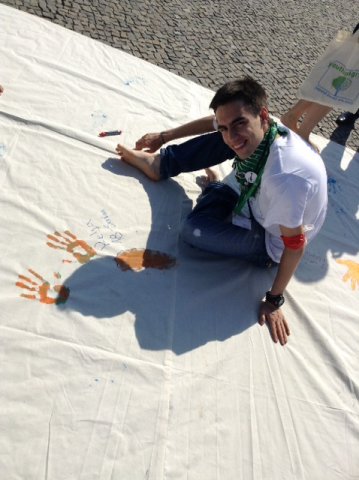Environmental School: School of the Future
The general concept:
When considering different concepts for developing a school of the future, it is not necessary to focus only on protecting the environment. Young people already grasp the basic ideas of sustainability and green issues.
The issues to address are those that affect the child’s ability to benefit from the class through self expression and open thinking. It is important not to destroy the child’s spirit and creativity.
Children spend so much time on homework and tests every day that they have little time or energy to observe what is happening in the world around them. These observations are as important, if not more important, than taking a chemistry test, for example.
A school should also focus on the principles of teamwork and empathy rather than competition for a high rank in the social structure. Competitiveness causes “soul scars” that impede the idea of solidarity among people.
Leading Children of the Earth projects and workshops (www.fors.org.rs) in Serbia has shown the author alternative teaching methods:
- Instead of a traditional classroom model for children aged eight to twelve, initiate a non-hierarchal environment in which the students see the teacher as a role model and friend rather than an authority figure. The students would feel more comfortable expressing themselves and becoming involved in discussions.
- Students begin to think outside the box. In the author’s class, students spent time outside where they were able to experience in nature the meaning of biodiversity and ecosystems. They learned much faster because they were engaged and had the freedom to experiment and independently observe. They were able to trace back every person’s roots and understand their inter-connectedness.
- Children should learn through experimentation, observation and pursuing their interests. Peer and social learning should be encouraged. The school of the future should be based on teaching which brings out the very best in every child and fills the child with joy. Children can learn to grow into adults who will enjoy volunteering and being involved in their communities. These children would also learn to be independent and self-reliant.
- The new schools would provide teaching and learning opportunities that match the challenges and opportunities of today.
The model:
1) Curriculum: using new teaching methodology to teach as well as adding new topics to the curriculum.
- Global citizenship education: teaching children global values, promoting tolerance and understanding of religious and national diversity, keeping students up to date with global events and issues and discussing solutions that would lead to world peace.
- Ecology education: studied in lower grades with the purpose of introducing basic terminology and problems of ecology in modern society as a basis for further studies on sustainable development.
- Nature and Science projects: attended by students with an interest in the sciences connected to sustainable development including biology, chemistry, physics and sociology. (Students would be able to work on actual projects which include environmental impact assessments and other studies)
- Greenhouse education: students would learn how changing their behavior can reduce the amount of greenhouse gasses (Learning the interconnection to chemistry and biology and the negative impact of greenhouse gases on the environtment.)
2) Age difference:
- Change the way classes are grouped by age: 6-10 years, 11-14 years and 15-18 years
- Adapt the curriculum so that definitions and laws of science are more understandable for each age level.
- Natural sciences should be taught out in nature, including observations and experiments
- The younger two groups of children would study ecology while the older children would study global citizenship, including problem solving through discussion and teamwork.
- The older group of children would study global citizenship. Students could sit in circular rows with a free space in the middle whereby they could have discussions in an environment similar to Parliament with the teacher as moderator. Students would learn to overcome conceptual differences through dialogue and without verbal conflict.
- All groups would attend greenhouse classes.
- All groups would interact with the older students taking a mentoring role with the younger ones. This would be beneficial to all students as younger students would be able to express their opinions to someone close to their own age and older students would develop confidence in working with the younger children. All students would develop a feeling of self worth.
3) Teaching methodology
- Teachers would attend courses to learn the new teaching methods.
- Teachers would take courses in sustainability to increase their knowledge in the field.
- Teachers would instruct students on the code of ethics, including learning respect, love, honesty, truth, courage, humility and wisdom.





